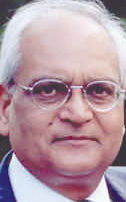Guest opinion: Serving others, not feasting on them, is the recipe for decency in politics

Photo supplied, Weber State University
Hal CrimmelRecently I was discussing cannibalism with students in the context of human behavior. The Fijian Ratu Udre Udre deserves a place in the Cannibal Hall of Fame. He’s actually in “Guinness World Records” under “Most Prolific Cannibal.” He lived on the island of Viti Levu until his death around 1840, and during his lifetime he ate at least 872 of his enemies. According to a 2017 article by British archeologist Dr. James Cole, the average victim eaten by cannibals yielded 121.57 pounds of meat. As a chief, Udre Udre would have dined only on the best parts of enemies, but still, the dude had serious carnivorous chops.
Cannibalism wasn’t confined to the South Pacific. Cole’s study was based on Paleolithic era cannibalism in Western Europe, which got me wondering if the modern Paleolithic diet fad ever considered human flesh. Surely debates would have ensued as to whether it should be classified as red meat. Apparently human flesh has a pork-like taste, and when cannibalism was still prevalent in the South Pacific, victims were mockingly known as “long pig” — long, as in tall, like a human.
You rightfully may be wondering why I am thinking about cannibals. I’ve been rereading “The Happy Isles of Oceania” by the talented novelist and travel writer Paul Theroux. He mentioned Udre Udre’s tomb on a remote spot in Fiji, and since I had once visited there my imagination rambled. I remembered Te Papa Tongarewa, the Museum of New Zealand, where I saw beautifully carved wooden utensils for eating human flesh. Udre Udre reportedly had a specific model named after him, sort of like a cannibal version of Air Jordans, but with spiky prongs.
Aside from acquiring a taste for the meat, those practicing cannibalism felt it was the ultimate in displaying triumph and inflicting humiliation, according to The Fiji Times.
And that notion in turn got me thinking about today’s domestic politics with its beat-and-eat mentality. The weaponization of the government shutdown seems to have little to do with a workable compromise. The United States Forest Service website contains a message faulting “Radical Left Democrats” for shutting down the government. Really? I just want to get a permit to harvest a Christmas tree!
If there’s one thing the pandemic made clear, the veneer of society is rather thin. It seems just a matter of time before T-shirts with slogans such as “Democrats: The Other White Meat” or “Republicans: The Other White Meat” will hit store shelves, echoing a 1980s campaign by the National Pork Board to pitch pork as a healthy alternative to chicken.
Politics is a blood sport, and for a number of years one side had the bruising upper hand. One manifestation was felt in workplaces across the country, including universities, where employees had to sit through humiliating meetings, expected to confess prejudices and acknowledge cultural wrongdoing. Introspection is essential, but many felt prioritizing one topic above all others, especially at universities, was short-sighted. Climate change, for example, poses an existential threat to all. Should climate change be at the top of the list? Many wondered if there should even be a list.
Academic freedom means faculty should be able to support or contest any idea. Debate is essential. I might not agree with some reasoning. That’s ok — often I don’t fully agree with my own reasoning! But censoring any one line of thinking goes against the ideals of universities and the democratic traditions of our nation.
And now the bruising upper hand of the censorship pendulum has swung to the conservative side of the aisle. It’s where the president of the United States can pressure a major network to remove a comedian who makes fun of him. Or where state legislatures across the country can pass bills prohibiting colleges and universities from using the words diversity, equity and inclusion in specific institutional contexts. But maybe using new words such as versity, quity, and clusion (VQC) could allow for the conversation to continue in areas where it’s not allowed. If words don’t fit the bill, so to speak, maybe invent new ones?
When I was a child, it was not uncommon for the mothers in my neighborhood to wash out somebody’s mouth with a bar of soap as punishment for using a bad word. Censorship in some form runs deep, even at the family level. But today our leaders’ constant and vicious settling of political scores and the never-ending attempts to silence one another seem a form of neo-cannibalism. Politicians, egged on by their constituents, seem to relish feasting in this way.
But can individuals find a way to insist on decency? Whether in the context of the National Governors Association’s “Disagree Better” initiative, or ideals espoused in religious traditions, or via personal standards, or athletic norms, there’s hope. Hockey players shake hands after even the most violent games. It generally feels good. Fights rarely break out in the handshake line. Say “good game,” no matter how bitter the loss. Let’s think more about shaking hands.
Politics needs to focus on serving others, not on how others would taste served on a platter.
Otherwise, fire up the umus and lovos — traditional earth ovens used across the South Pacific — and let the cooking and feasting on opponents continue, in a never-ending cycle.
Hal Crimmel is a Brady Presidential Distinguished Professor of English who served for nine years as chair of the English department at Weber State University. This commentary is provided through a partnership with Weber State. The views expressed by the author do not necessarily represent the institutional values or positions of the university.



